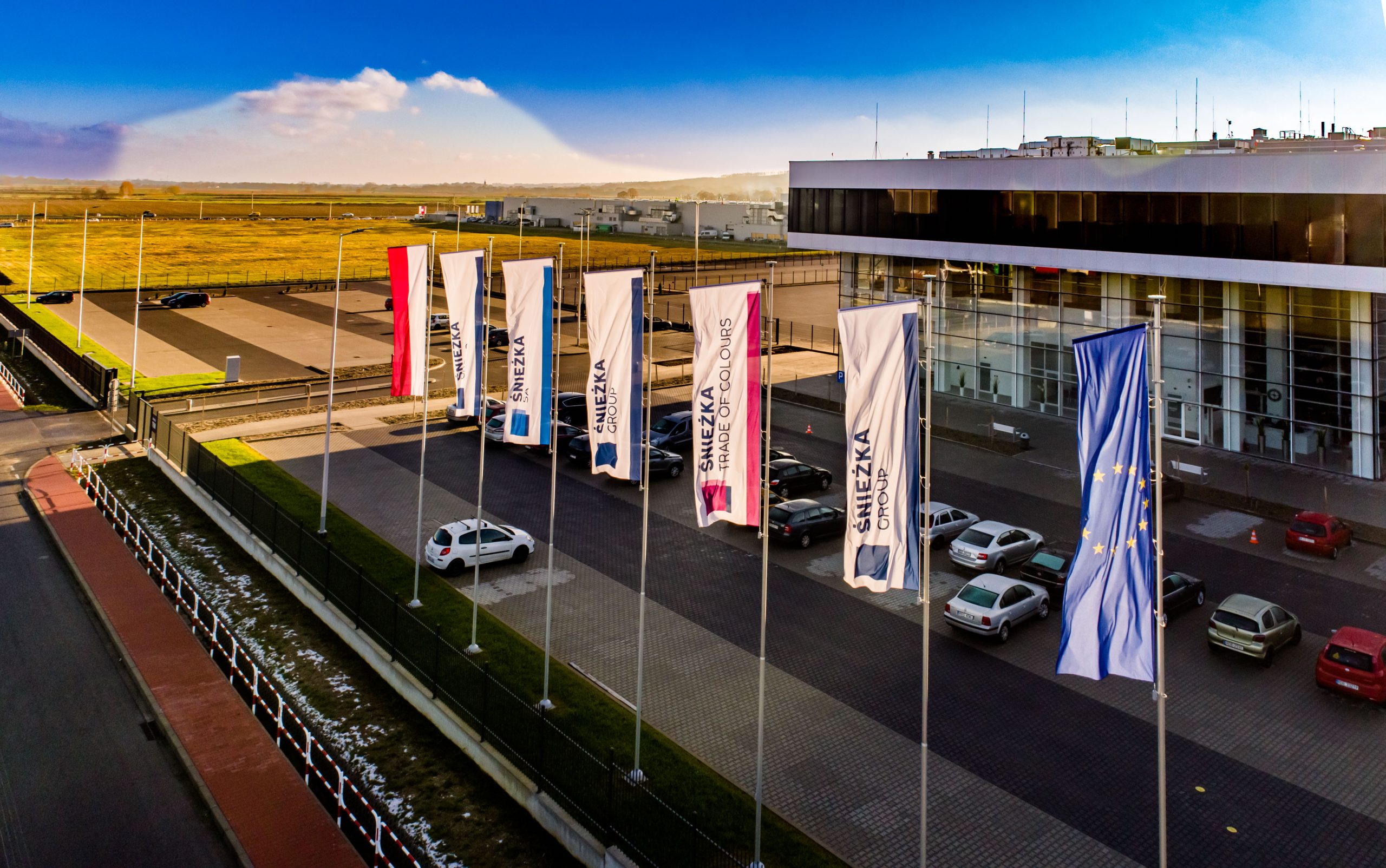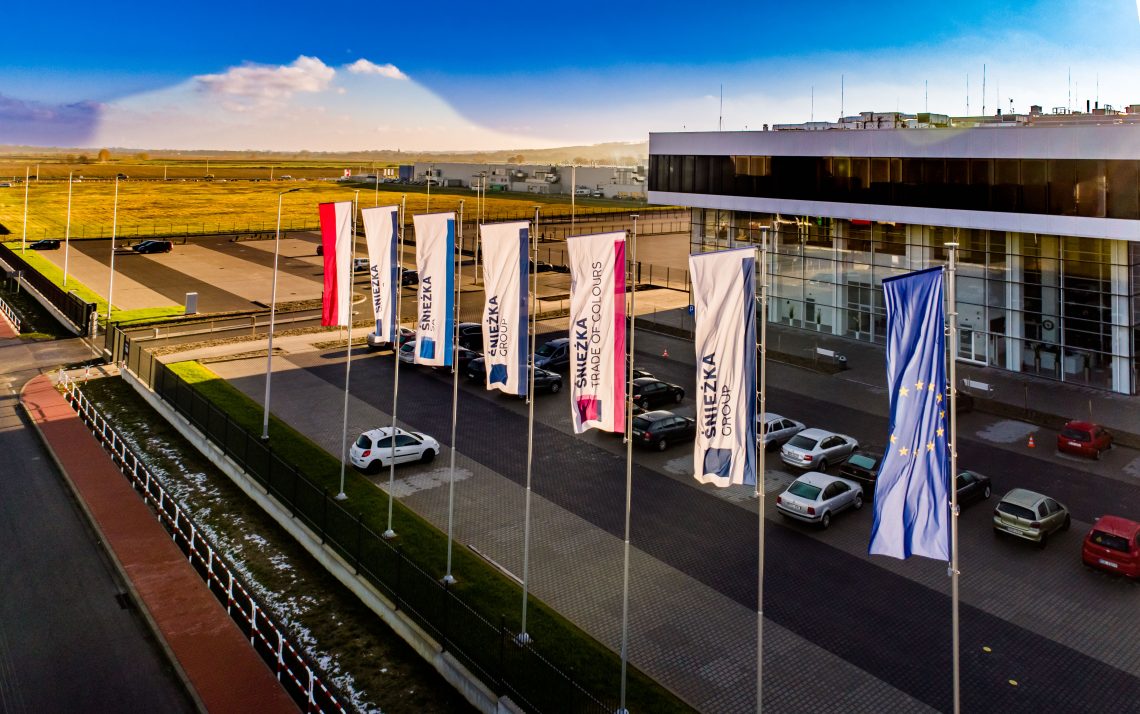
Śnieżka has summarized the previous year and announced its sustainable development strategy
In 2022, the Śnieżka Group, despite difficult circumstances, increased its shares on all three key markets: Polish, Hungarian and Ukrainian. The better sales performance in Poland and the revival of demand for Śnieżka's products on the Ukrainian market contributed to maintaining the level of revenues year on year. Together with the summary of the results for the past year Śnieżka presented a plan for development in ESG areas. Śnieżka 2023+ Sustainable Development Strategy focuses on 21 measurable strategic objectives and 71 actions for the sake of the environment, people and business.
Throughout 2022, the Śnieżka Group generated sales revenues of PLN 791.7 million, which is only slightly (-0.4%) lower than in the previous year. On the one hand, this is the effect of the continuing trend of going for premium products by consumers, effective marketing and sales activities and pricing policy, and on the other hand – lower consumer demand and the consequences of the war in Ukraine.
The Group recorded a 1.9% increase in sales on its core market, Poland. At the same time, the decrease in revenues on the second for the Group Hungarian market amounted to 5.4%, yet it was caused by the weakening of the Hungarian forint. In local currency, Hungary recorded revenue growth of 5.2%. On the Ukrainian market, sales fell by 15% due to the hostilities. In 2022, the demand for Śnieżka’s products in Ukraine was gradually recovering – good sales performance is particularly noticeable in the western and central regions of this country, although the situation remains uncertain.
Against the backdrop of the serious challenges we struggled with, I consider the Śnieżka Group's performance for 2022 to be very good. Throughout the Group, we generated comparable revenues despite a noticeable decline in consumer sentiment. We are particularly pleased with strengthening of the market position on all key markets and the unexpectedly good performance of Śnieżka-Ukraina.
Like many industries, however, we experienced the effects of the rapid increase in inflation and other unfavourable external factors on our financial and business performance. We effectively limited their impact through agile management (including monitoring and adapting costs to the current market situation) and deriving from the effects of our previous investments – e.g. into our Logistics Centre, which, supported by modern IT solutions, allows us to manage logistics processes more effectively and adapt them to current demand – adds the president of Śnieżka.
Adverse external conditions resulted in an increase in the Group’s costs, including packaging, a number of services and raw materials. Consequently, the operating profit decreased by 8.0% y/y (to PLN 69.4 million) and EBITDA by 4.7% y/y (to PLN 106.2 million). The net profit, which decreased by 35.9% (to PLN 41.3 million), was additionally adversely affected by a significant increase in financial costs, primarily related to higher interest rates on loans.
Completion of the largest investment in the history of Śnieżka will reduce future CAPEX
At the beginning of the previous year Śnieżka commissioned a new Logistics Centre. This is the largest single investment in fixed assets in the company’s history. It allowed for a significant improvement of logistics processes, which are now fully scalable and supported on a day-to-day basis by advanced IT technologies. This allowed to increase the quality of processes and reduce their costs.
As announced, after implementing a record-breaking investment program in 2018-2022, Śnieżka is currently bringing down capital expenditures. The total value of investment expenditures planned for 2023 is to amount to approximately PLN 42 million.
"Green matters": Śnieżka's sustainable development objectives
Śnieżka enters 2023 with the Śnieżka 2023+ Sustainable Development Strategy, which is a response to the growing awareness and expectations of consumers and business partners. As part of it, a total of 21 strategic and 71 operational objectives were set for actions within the ESG areas. They are focused on three pillars – Environment, People and Business.
The “Environment” pillar primarily assumes an increase in the value of sales of products with a low environmental impact to 50% by 2030. This objective will be achieved owing to the development of the product portfolio and the acquisition of additional product certificates. Śnieżka also intends to optimize the consumption of resources, including the reducing of industrial water use in one of the key production plants of the company by 10% – as a result of implementing a new technology for cleaning equipment and installations. Śnieżka’s strategic assumptions include also: measurement of the Group’s carbon footprint in all three scopes based on the GHG Protocol (Greenhouse Gas Protocol) standard. In pursuit of this objective, the Śnieka Group’s carbon footprint was already specified in the report for 2022 within scope 1, 2 and 3. The company is currently working on reduction targets. Śnieżka SA will also commence the transformation towards its own green energy sources. The first photovoltaic system is to cover approximately 30% of Śnieka’s annual energy demand as early as 2025. The undertaking will start this year and most of Śnieżka’s yearly investment budget will be allocated to it.
As for the “People” pillar the objectives include: maintaining comparability of salaries of women and men holding similar positions (adjusted pay gap below 5%) and increasing the number of training hours per employee. Śnieżka also focuses on a safe working environment, therefore it intends to conduct additional first aid and defibrillator training in 2023, with which it plans to equip all its facilities in the Sub-Carpathian region. Further development of CSR activities was also adopted under the “People” pillar.
Among the business priority areas defined in the “Business” pillar, there are, inter alia: further attention to compliance, development and education in the field of cybersecurity and the development of a new risk matrix – taking into account climate risk.
“We have been carefully preparing to announce our first ESG strategy. We analysed our business model, collected opinions from several hundred of our stakeholders, and engaged dozens of Śnieżka managers and experts in the work on the document. As a result, we have developed a materiality matrix, and our sustainable development strategy focuses on actual challenges and opportunities that we will use in activities based on the idea of sustainable development – says Piotr Mikrut
The Sustainable Development Strategy was developed for FFiL Śnieżka SA (parent company) and Śnieżka Trade of Colours Sp. z o. o. Ultimately, it will cover the entire Capital Group.


